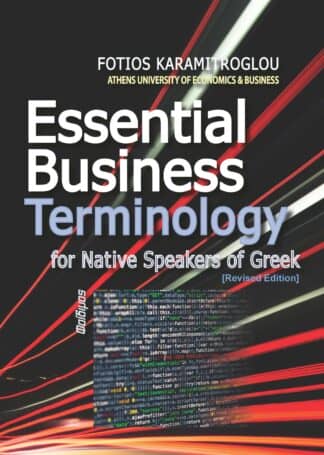Περιγραφή
Overview
This book has been designed to serve the needs of two terminology-based modules run by the Athens University of Economics and Business (AUEB). It is a coursebook, in essence, that epitomises the keynotes and material delivered in-class to 5th semester students of the Department of Business Administration and 7th semester students of the Department of Accounting & Finance. This is the reason why its content is predominantly finance-oriented. Another reason, though, derives from observation and feedback on the needs of students attending the English Language modules at AUEB, as well as consultation with fellow teachers at other tertiary education institutions where Business English is generally taught.
Key Figures
The book comprises 6 Chapters and 29 Units overall. The Units contain an aggregate of around 1360 primary terms, around 840 semantic fields that explode into almost 3450 primary and secondary terms, and approximately 800 collocations. This equals to an average of 47 primary terms, 29 semantic fields that contain 120 primary and secondary terms, and approximately 27 collocations. 14 Units begin with a text in English, whereas 15 start with a Greek text as reference. On average, each Unit is about 580 words long and can be fully covered within 3 hours of teaching. This means that 87 hours of teaching is the expected benchmark, if a teacher is to exhaust each and every Unit.
Structure
Each Unit comprises 4 types of drills. Exercise A’ depends on the language of the text which is used as reference, whereas exercises B’, C’ and D’ are common, irrespective of the language of the reference text.
More specifically, if the reference text is in English, students are asked in Exercise A’ («Vocabulary Building») to match a list of terms in Greek with their counterparts in English, as they appear in the reference text. If the reference text is already in Greek, selected Greek terms from the text are matched with three multiple choice options of potential English equivalents, and students are asked to identify the correct option. In this latter case, more than one options may be correct, but never all three.
Exercise B’ («Clarifying Terminology and Expanding Vocabulary») is an extension of Exercise A’. Greek terms which appear as primary in Exercise A’ are used as starting points, wherefrom related secondary terms that belong to the same semantic fields but have narrower, broader or other related usage are juxtaposed and contrasted.
Exercise C’ («Useful Collocations») aims to put the terms in context. A verb, adjective, adverb or noun is sought to accompany a term so as to build a correct collocation.
Finally, Exercise D’ («From Term to Text») sums up all aspects discussed in the three previous drills and calls for the whole text to be translated into the other language (English from/into Greek), therefore moving from the term-and-phrase to the sentence-and-paragraph level.
Suggested Use
The book has been designed to serve a variety of Business English audiences and cover a range of terminological aspects. If the audience is Business Administration oriented, the teacher is advised to focus on Chapter 3, and parts of Chapters 1, 4, 5 and 6. If the audience is Marketing & Communication oriented, the teacher is advised to focus on Chapters 5 and 3, and parts of Chapters 1, 4 and 6. If the audience is Accounting & Finance oriented, the teacher is advised to focus on Chapters 2 and 1, and parts of Chapters 4 and 6. Finally, if the audience is oriented towards European & Economic Studies, the teacher is advised to focus on Chapters 6, 1 and 2, and parts of Chapters 3 and 4.
Disclaimer
This is to state explicitly that the extracts used in the present coursebook may not correspond to their original sources, since their content has been severely manipulated, adjusted and/or condensed to serve the specific terminological needs of each and every Unit. Original sources have been merely used as points of influence or inspiration, to create texts that combine richness of vocabulary and authenticity of content and style.
Κυκλοφορεί νέα έκδοση: ESSENTIAL BUSINESS TERMINOLOGY FOR NATIVE SPEAKERS OF GREEK [REVISED EDITION]




